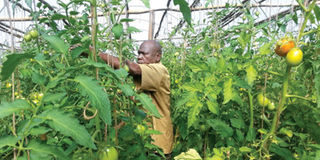Maize farmers diversify crops to net in the extra income

PHOTO | GERALD ANDAE Mr Eliud Wechuli a farmer in Trans-Nzoia County tends to his tomatoes which supplement his maize earnings.
What you need to know:
- The need for quick cash during the growing period sees them opt for other plants such as bananas, coffee and tomatoes
Farmers in Rift Valley are diversifying from maize production due to the length of time that it takes before harvesting. It takes almost a year between planting and harvesting the grain.
Due to the need for cash during the growing period, a number are now setting aside portions of their farms to grow other crops to ensure round-the-year harvesting.
The crops include bananas and tomatoes. Others have started coffee production.
Farmers interviewed by Smart Company said relying on maize alone is untenable as it does not get them a quick source of income to meet their daily needs.
“Maize is so involving and to achieve the best, one needs to have an alternative source of cash to meet the expenses involved,” said Mr Eliud Wechuli, a farmer in Trans-Nzoia County.
The grower who has planted tomatoes in a greenhouse and tissue culture bananas said the income he gets from these crops has helped him meet his daily needs without necessarily having to wait for a whole year to earn from maize. “Initially it was so difficult for me to top-dress maize and pay school fees for my children, but since I diversified, I’ve been able to meet all these needs with ease,” he said.
Trans-Nzoia West area agricultural officer Josephat Ling’ang’a urged other farmers who are still depending on maize alone to farm other crops, too. “It is important that farmers make economic gains by adopting diversification rather than depending on maize alone,” he said.
Mr Wechuli said diversity is key to stabilising the price of maize given that many farmers who rely on it as their only cash crop rush into selling the produce immediately after harvesting, hence flooding the market.
“This is about market forces of demand and supply; if all farmers sell maize at the same time, definitely the supply will be high, pushing the price down,” he said. Mr Wechuli said if farmers can use alternative sources of income to meet their daily needs and withhold maize stocks for a while, then the price will be stable.
Cartels in major maize growing zones have been exploiting desperate farmers in need of quick cash by offering them low prices.
Currently, the National Cereals and Produce Board (NCPB) is buying maize at Sh3,000 per 90 kilogramme bag, but farmers without access to NCPB are selling it to middlemen at as low as Sh2,000. At times, producers opt to sell their stocks to middlemen to avoid transport costs to NCPB depots.
Mrs Margret Gichuki, a farmer in Trans-Nzoia, is supplementing her income from coffee that she planted a year ago on one of her farms in Cherangani. “I now get monthly returns from coffee. It has been a great supplement to my income as I no longer depend on maize as the only source of money,” she said.
Mrs Gichuki said many farmers have suffered over the years because of relying mainly on maize as a source of income. “The maize that is in the field needs an additional source of money to meet the expenses that include first and second weeding, top-dressing and harvesting. A farmer might get stuck or register poor harvest if there is no other means of income to pay for these activities,” she said.
Mr Wechuli has adopted tissue culture bananas given its early maturity nature. This breed starts yielding after a year and one stem produces six suckers on average. He advises other farmers not to shun maize farming but to set aside a portion of their land for the crops.
“Farmers need to spare a small portion for the tissue culture banana or build a small greenhouse for tomatoes and they will reap good returns,” said Mr Wechuli who earns over Sh200,000 from a quarter acre of land every year from bananas.




